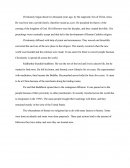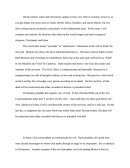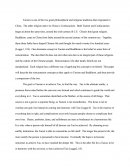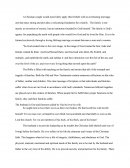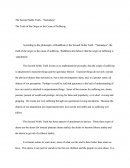Buddhism and christian essays and research papers
Last update: March 28, 2017-
Ap Essay Buddhism Christianity Diffusion Differ
Paulina Oswald AP World History Per.3 Buddhism and Christianity both originated in the same time period, have similar founders and early struggles of diffusion. They differ in their reasons for becoming popular universalizing religions. Both Christianity and Buddhism were founded at around the same time with founders who were very much alike. Although Jesus was poor and Buddha was rich they both devoted their lives to their religion, Buddha in the process throwing away his
Rating:Essay Length: 631 Words / 3 PagesSubmitted: August 10, 2015 -
Buddhism And Christianity In The Same Light
A community, a system of belief, a tradition and a way of life- Catholicism and Theravada Buddhism are all of these and many more. There are many affinities between Theravada Buddhism and Catholicism, but each tradition is marked with its own unique origins. Thus it is valuable to explore Buddhist rituals, practices, ethics and morals comparatively to those Catholic, but equally important to examine those features that are uniquely their own religion. Every religion that
Rating:Essay Length: 667 Words / 3 PagesSubmitted: September 27, 2010 -
Buddhism Vs. Christianity
Christianity began about two thousand years ago, by the supposed, Son of Christ, Jesus. He was born into a jewish family, therefore raised as a jew. He preached his theory of the coming of the kingdom of God. His followers were his deciples, and they created the bible.. His preachings were eventually accept and that led to the development of Roman Catholic religion. Christianity diffused with help of priest and missionaries. They moved ond forcefully
Rating:Essay Length: 271 Words / 2 PagesSubmitted: November 7, 2010 -
Buddhism Vs Christianity
Emerging during the classical period, Buddhism and Christianity are both similar and different in many ways. Christianity and Buddhism each arose where important religious developments had already occurred. After the classical period they both experienced great success, and they offered hope for religious advancements. Each religion sought to disperse with what their leaders viewed as excessive ceremonies and religious officialdom in favor of spiritual focus, with a belief in the afterlife. Both expressed suspicion of
Rating:Essay Length: 319 Words / 2 PagesSubmitted: November 19, 2010 -
Buddhism and Christianity Diffusions
Paulina Oswald AP World History Per.3 Buddhism and Christianity both originated in the same time period, have similar founders and early struggles of diffusion. They differ in their reasons for becoming popular universalizing religions. Both Christianity and Buddhism were founded at around the same time with founders who were very much alike. Although Jesus was poor and Buddha was rich they both devoted their lives to their religion, Buddha in the process throwing away his
Rating:Essay Length: 631 Words / 3 PagesSubmitted: August 10, 2015 -
Buddhism
In examining the Buddhism religion, particurally the role of women in Buddhism, it was quite clear that the religion of Buddhism is practiced very different from country to country. Buddhism is a philosophy of life expounded by Gautama Buddha ("Buddha" means "enlightened one"), who lived and taught in northern Inda in the 6th Century B.C. The Buddha was not a god and the philosophy of Buddhism does not entail any theistic world-view. The teachings of
Rating:Essay Length: 2,845 Words / 12 PagesSubmitted: August 26, 2010 -
Christianity Vs Islam
On the surface, Islam and Christianity appear to have very little in common, however, as you get deeper into areas such as rituals, beliefs, ethics, founders, and sacred objects, the two show strong mutual similarities, particularly in the fundamental areas. In this essay I will compare and contrast the doctrines that make up the worlds largest and most recognized religions, Christianity and Islam. The word Islam means "surrender" or "submission," submission to the will of
Rating:Essay Length: 1,615 Words / 7 PagesSubmitted: August 27, 2010 -
Reincarnation: Taoism And Buddhism
Taoism is one of the two great philosophical and religious traditions that originated in China. The other religion native to China is Confucianism. Both Taoism and Confucianism began at about the same time, around the sixth century B.C.E. China's third great religion, Buddhism, came to China from India around the second century of the common era. Together, these three faiths have shaped Chinese life and thought for nearly twenty-five hundred years (Legge1, 124). One
Rating:Essay Length: 2,356 Words / 10 PagesSubmitted: August 28, 2010 -
Buddhism
Everything is suffering. Humans define their existence by misery and suffering. The four Noble Truths are all about suffering. Suffering, the origin of suffering, Nibbana, and the Path. The word suffering is utilized throughout all the texts and teachings of Buddhism. Suffering is defined as; to feel pain or distress; sustain loss, injury, harm, or punishment. Buddhist uses a deeper meaning of suffering, which is a change or ultimate unsatisfactory. Even if one is
Rating:Essay Length: 678 Words / 3 PagesSubmitted: August 30, 2010 -
The Differentiation Of Beliefs In Hinduism And Buddhism
The Differentiation of Beliefs in Hinduism and Buddhism While Hinduism and Buddhism come from the same cultural backgrounds, they are extremely diverse in their beliefs on afterlife, deity, and rituals. Both religions believe in reincarnation, but it is where an individual goes after he or she gets off the endless cycle that differs. These religions also part when it comes to whom they do or do not worship. Every religion comes with rituals and Hinduism
Rating:Essay Length: 480 Words / 2 PagesSubmitted: August 31, 2010 -
Hinduism Vs Buddhism
Hinduism and Buddhism are two influential religions of the world. Both holding philosophical traditions and originating in India. Hinduism dating back to about 2500 B.C.E. identifies four central themes in its belief system. They include spiritual aspect, conduct of life, truth and reality and intuition. "Hindus consider all of creation worthy of worship, and thus religious activity in Hinduism takes many forms" ( http://encarta.msn.com/encnet/refpages/RefArticle.aspx?refid=761555715&pn=2&s=17#s17). Buddhism dating back to 65 A.D. is similar in that it
Rating:Essay Length: 289 Words / 2 PagesSubmitted: September 6, 2010 -
Christianity According To St. Augustine And Machiavelli
In St. Augustine's book entitled Political Writings, one could see that Christianity plays a very important role in his view of politics. His opinion on the morality or lack of morality in politics, to me makes it more evident that Christianity persuades his views. Although it seems his writings have become quite well known and admired, not everyone fully shared his beliefs. Niccolo Machiavelli, for instance, seemed to believe in a government that was not
Rating:Essay Length: 1,435 Words / 6 PagesSubmitted: September 7, 2010 -
The Role Of Christian Women Vs Islamic Women
The Koran vs. The Holy Bible? The Bible is the word of God that is a cherished throughout the world and translated in many different ways. There are believers who try to follow the word of God the moral way through The Bible. The Koran is a book that tries to guide believers in the right direction, because they decided that the Jews and Christians disobeyed God's commandments by dividing themselves into sects. In result,
Rating:Essay Length: 601 Words / 3 PagesSubmitted: September 7, 2010 -
Buddhism
Zen; Buddhism's trek through history, politics, and America Zen, or Zenno (as it is known by the Japanese word from which it derives), is the most common form of Buddhism practiced in the world today. All types of people from intellectuals to celebrities refer to themselves as Buddhist, but despite its popularity today in America, it has had a long history throughout the world. "Here none think of wealth or fame, All talk of right
Rating:Essay Length: 1,224 Words / 5 PagesSubmitted: September 10, 2010 -
Christians
What are people doing when they say they are worshipping? Worship is the praise of God and one's beliefs. Worship is a set of actions that are set forth to proclaim how a person feels regarding God or any thing a person looks highly upon. There are many parts to worship. Some of these parts consist of rituals, symbolism and personal actions as well When a person worships they must first decide what is important
Rating:Essay Length: 310 Words / 2 PagesSubmitted: September 12, 2010 -

Death From A Buddhist And Christian Point Of View
Death from a Buddhist and Christian Point of View "You will be with me today in paradise," Jesus Christ told this to the thief on the cross while they were dying. However, can people believe that there is truly life after death? In many different religions there are different perceptions of life after death. For example in the Buddhist religion, the Buddhist people believe that life is practice for death. Professor Brown, of California State
Rating:Essay Length: 1,118 Words / 5 PagesSubmitted: September 15, 2010 -
How A Christian Couple Would Apply These Beliefs In Their Married Life
A Christian couple would most likely apply their beliefs with an everlasting marriage, one that stays strong and provides a welcoming foundation for a family. The family is not merely an invention of society, but an institution founded by God himself. The family is God's agency for populating the earth with people who would love God and be loved by Him. It is to be formed exclusively through a loving lifelong marriage covenant between a
Rating:Essay Length: 944 Words / 4 PagesSubmitted: September 17, 2010 -
Beowulf, Christianity, And Paganism.
Beowulf, Christianity, and Paganism. The poem Beowulf is a renowned story that displays many different surroundings and religious beliefs. Some may believe the story of Beowulf portrays pagan beliefs or customs and others believe that the poem is more in agreement with Christian ethnicity. The author of Beowulf uses both Christian and pagan elements in the poem to define the heroic warrior, Beowulf, and the evil dragons. After reading Beowulf the author clearly shows
Rating:Essay Length: 969 Words / 4 PagesSubmitted: September 17, 2010 -
Buddhism: The 4 Noble Truths
Buddhism's Four Noble Truths Siddharta Gautama was twenty-nine years old when he abandoned his family to search for a means to bring to an end his and other's suffering after studying meditation for many years. At age thirty-five, Siddharta Gautama sat down under the shade of a fig tree to meditate and he determined to meditate until he reached enlightenment. After seven weeks he received the Great Enlightenment which he referred to as the Four
Rating:Essay Length: 2,139 Words / 9 PagesSubmitted: September 21, 2010 -
The Second Noble Truth Of Buddhism
The Second Noble Truth - "Samudaya" The Truth of the Origin or the Cause of Suffering According to the philosophy of Buddhism is the Second Noble Truth : "Samudaya", the truth of the origin or the cause of suffering. Buddhists also believe that the origin of suffering is `attachment'. The Second Noble Truth invites us to understand the principle, that the origin of suffering is attachment to transient things and the ignorance thereof. Transient
Rating:Essay Length: 814 Words / 4 PagesSubmitted: September 24, 2010 -
Buddhism
The origin, traditional Buddhism began in the 6th century BC with the historical personage born Siddhartha Gautama, but better known by a variety of titles including Shakyammi, Tathagata, or most commonly Buddha, the enlightened one. The legend of the Buddha's life has acquired plenty of variations and embellishments over the years, but the basic facts are accepted as traditional, including the dates of his birth and death (563-489 BC by Western reckoning, 624-544 according to
Rating:Essay Length: 1,237 Words / 5 PagesSubmitted: September 27, 2010 -
Buddhism
Buddhism is a major religion, founded in northeastern India. Buddhism was based on the teachings of Siddhartha Guatama, who is known as "Buddha" The Enlightened one. Buddha is divided into two major groups known as "The way of the Elders" and "Mahayana" the great vehicle. Siddhartha Guatama was born in 563 BC in Kapilavastu near the Indian-Nepal border. The young prince withdrew all his luxury and went on a quest for peace and enlightenment. When
Rating:Essay Length: 396 Words / 2 PagesSubmitted: September 30, 2010 -
Christianity In A Postmodern World
Christian Belief in a Postmodern World: The Full Wealth of Conviction Others have tried to do what Diogenes Allen, Professor of Philosophy at Princeton Theological Seminary, does in his book but none with his breadth or effectiveness. That is, others have attempted to exploit for theism's benefit the hard times now befalling the modern world's emphasis on scientific reasoning and pure rationality, which for quite a while had placed Christianity (and religious belief in general)
Rating:Essay Length: 7,683 Words / 31 PagesSubmitted: October 1, 2010 -
Christian Science V Morman
Introduction With the advancements in the study of social sciences, there has been a somewhat parallel growth of cults which though have their foundations in the original Bible and the Christian teachings, yet one may observe that the majority of the present day cults not only deny the essential doctrines, they openly emphasize and present their own personal reinterpretations of the biblical scriptures. The following paper will present two such cases, those of Christian Science
Rating:Essay Length: 1,822 Words / 8 PagesSubmitted: October 1, 2010 -
Intrinsic Flaws In Christianity - Edited And Spell Checked
Christianity is a religion in which events are claimed to have occurred but which can never be proved. Those who practice it live by different morals than are preached by the most holy texts. It is an institution in which the most Holy Scripture is contradictory, and wherein the Supreme Being, by the very definition, cannot exist. Christianity is, therefore, a fundamentally flawed religion. According to the Bible, events have occurred which are even more
Rating:Essay Length: 1,423 Words / 6 PagesSubmitted: October 1, 2010


